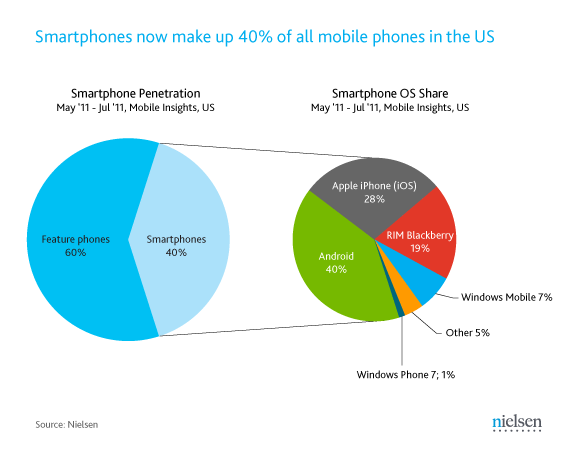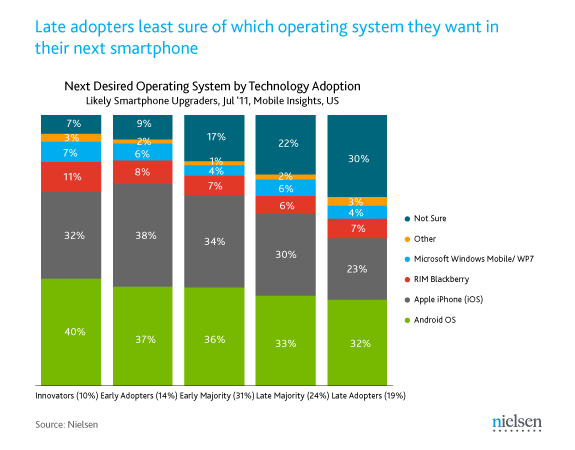Android makes big gains in the post-Steve Jobs era

Apple cofounder Steve Jobs has repeatedly talked about the post-PC era. But he resigned last week as Apple's CEO. The post-Steve Jobs era has come, and Android is doing just fine whipping iPhone in his absence. This week, comScore put Android's US smartphone share way up against iPhone's minuscule gains, and today Nielsen added supporting stats, including some startling buying intention trends.
"What?" You ask. "Jobs has only been gone a week". Yes, but as I explained over the weekend, his influence waned long ago. Tim Cook, while only CEO since Thursday last, has been running Apple since January. How's iPhone doing against Android, during the Tim Cook era? Certainly not bad, but not as well as many people believe. I was talking with a neighbor tonight about phones and he was sure that iPhone outsells Android. I hear this often.
The comScore and Nielsen data also impugns the Apple fanclub of bloggers and journalists who just months ago cried Android's doom based on wrong presumptions about Verizon iPhone. Late-June TechCrunch post "The Verizon iPhone Halted Android's Surge. The iPhone 5 Could Reverse It" reflects the kind of misinformation spread by Apple fanclubbers.
Android gained a stunning 5.4 points of share sequentially, based on smartphone subscribers, during the three months ended July 31, according to comScore. By comparison, Apple's platform grew by 1 point of share. That puts iPhone share at 27 percent compared to 41.8 percent for Android. For the same three-month period, Nielsen put Android smartphone share at 40 percent and iPhone/iOS at 28 percent.
Nielsen also measures buying intentions. Don Kellogg, Nielsen's director of Telecom Research and Insights, blogs:
"Among those who say they are likely to get a new smartphone in the next year, approximately one third say they want their next smartphone to be an iPhone and one third say they want an Android device. However, among those who say they are usually the first to embrace new technologies, “Innovators” or the earliest of early adopters, Android leads as the “Next Desired Operating System” – 40 percent for Android compared to 32 percent for iOS. (Survey respondents were asked several questions to determine their attitudes toward new technologies.)".

Android is unstoppable, unless something changes. Perhaps iPhone 5 will be so astonishing or people will find iCloud so remarkable, sales with soar. Cook could also show the kind of innovation in logistics that Apple showed in product design and marketing under his predecessor, such as take drastic pricing action when iPhone 5 ships. In May, I explained how Apple could stop the Android army's advances by cleverly pricing iPhone 4 after its successor ships. Follow the success of the iPhone 3GS, which AT&T sells for $49, and offer iPhone 4 or a 4S model for, say, $99. Globally. Free would be even better, with carrier subsidy, in some regions.
That's the kind of risk Cook should consider during the early post-Steve Jobs era. It's a trade-off of margins for marketshare but would open new categories of buyers for Apple, particularly in emerging markets. With respect to pricing and margins, Apple has long played it safe. Is it time for change?
